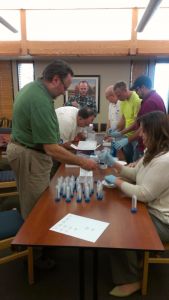
Biotechnology graduates contend with a Catch-22 as they begin biomanufacturing careers.
Medical device manufacturers, pharmaceutical companies, and other employers in highly-regulated biomanufacturing industries want technicians who have experience following Food and Drug Administration regulations. Internships that would provide students with real-world work experiences in these fields are rare, however, because government regulations limit what inexperienced people are permitted to do in biomanufacturing workplaces.
To address this challenge, Vivian Ngan-Winward, obtained an Advanced Technological Education project grant to create STUDENTfacturED, a company that provides a simulated, regulated environment at Salt Lake Community College (SLCC) where she directs the biomanufacturing program.
STUDENTfacturED is the second entrepreneurial program SLCC's Biotechnology Department has launched with ATE support. InnovaBio, a contract research organization at SLCC, was the first.
STUDENTfacturED Gives Students Experience with Quality Systems
Since January 2012, SLCC biotechnology and business students have run STUDENTfactuED for college credit. Students wrote the manufacturing procedures for assembling two products—Cheek Cell DNA Extraction Kits and Unknown Plasmid Samples for Student Assessments—and worked through the other steps to sell these products for use in college and high school classroom labs.
The products were chosen, Ngan-Winward explained, because they do not compete with commercial business products and making them requires students to use biotech industry-relevant skills they should master before entering real workplaces. Having the students focus on the principles of quality systems, as well as the practical steps to set up quality systems and work effectively in regulated environments prepares students for careers in various regulated industries.
In the photo, SLCC students and their mentors are "manufacturing" the cheek cell DNA extraction kits. The low-tech process has students measure salt and place it in blue-capped tubes; fill small tubes with soap; label both tubes; place these tubes and another empty tube plus two disposable eye droppers in a small plastic bags with instructions. The kit users make saline by adding water to the large tube with the blue cap, and then putting the saline into their mouths for the rinse and collection of DNA.
Aside from product development, creating an on-campus business comes with challenges such as figuring how to price products and handle payments within the community college's existing systems. Having the full support of the college's top administrators helped resolve these issues. "These little things, if you don't have the full support from the administration, could be big road blocks," Ngan-Winward said.
SLCC Receives Three ATE Project Grants
The Biotechnology Department at SLCC has not only had the full support of its administration and state government for its entrepreneurial approach, it has also received three ATE project grants totaling almost $2.1 million to blend business experiences into its biotech laboratory and biomanufacturing programs.
Its first ATE grant for $438,922 helped the college develop its Biotechnology Technician Associate of Applied Science degree to support the growing biotechnology industry in the Greater Salt Lake area.
Its second grant for $719,231 helped the college establish InnovaBio, a contract research organization within SLCC that provides students with experience working on real, commercial research projects. Years after this ATE grant expired, InnovaBio continues to provide research and development (R&D) experiences to about 70 students each year. In addition to the high school, community college and Utah Valley University students who receive academic credit, InnovaBio participants sometimes include displaced workers who learn new laboratory skills.
InnovaBio has served as the model for similar R&D programs at St. Louis Community College in Missouri; Hagerstown Community College in Maryland; Ivy Tech Community College in Bloomington, Indiana; and Montgomery County Community College in Blue Bell, Pennsylvania.
SLCC Biotech Department's third ATE grant for $909,443 created STUDENTfacturED.
InnovaBio Provides Students with R&D Experiences
Craig Caldwell, SLCC's Biotechnology director, said the ATE grants have made it possible for faculty members to work through the process of adding entrepreneurial businesses to community college students' learning. He is quick to point out that students' learning, not an income stream for the college is the point of both InnovaBio and STUDENTfacturED.
Although it charges companies for its services, Caldwell said, InnovaBIO could not continue without the college's allocation of workforce development funds it receives from the state of Utah."Our college and our state has found the resources and desire to do it," he said.
InnovaBio's biggest cost is employing a well-qualified scientist, with at least a master's degree, to work full time in the lab without other teaching responsibilities. "That's important, but it costs a lot," Caldwell said. The scientist mentors students, monitors students' work in the lab, and when necessary completes projects to meet contractual deadlines with the private businesses.
The college makes no claim to InnovaBio customers' intellectual property; it also warns clients not to share highly sensitive intellectual property information with it. This caution is plainly stated to InnovaBio's clients, Caldwell said because it is not possible to require students, who are sometimes minors, to sign non-disclosure agreements. The college must also comply with open record laws.
Ngan-Winward and Caldwell both stress that creating safe learning environments where students can make mistakes as they learn about the business of biotechnology is inherently inefficient. To other educators who want to start similar student enterprises, their succinct advice is to remember your mission.
"Our job is to take [students'] raw talent, get to a level of proficiency, and then send them out the door," Caldwell said.

 Subscribe
Subscribe


 See More ATE Impacts
See More ATE Impacts

Comments
There are no comments yet for this entry. Please Log In to post one.